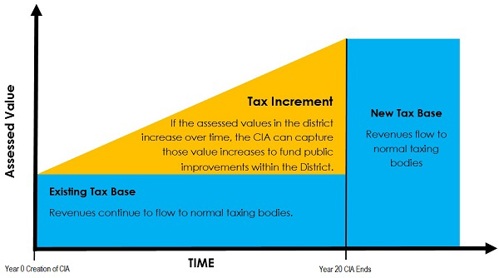The City of Novi has created a Corridor Improvement Authority (CIA) as a funding mechanism for corridor improvements on either side of Grand River Avenue from Wixom Road to Haggerty Road. A CIA is authorized under the Corridor Improvement Authority Act (PA 280 of 2005) and is governed by a Board of Directors whose primary purpose is to correct and prevent deterioration and promote economic growth within the corridor. Other purposes of a CIA include reversing declining property values, improving the overall business climate, and increasing employment opportunities.
A primary benefit of forming a CIA is the ability to capture the incremental increase in property taxes that results from improvements in the district. The captured revenues are used to finance public improvement projects within the district, as a means for jump starting economic growth. Local school taxes are not captured by the CIA.![]() Corridor Improvement Authority Act (PA 280 of 2005)
Corridor Improvement Authority Act (PA 280 of 2005)
Frequently Asked Questions
What is a Corridor Improvement Authority (CIA)?
The purpose of the Corridor Improvement Authority Act (Public Act 208 of 2005) is to help communities plan for and fund improvements along a corridor. The overall goal is to help support economic development and redevelopment of this area. The act in which this is created is very similar to Downtown Development Authorities.
Who is involved?
A CIA is governed by a Board of Directors, which is made up of the Mayor or his/ her designee, along with five to nine property owners and residents within and adjacent to the development area. The board would also be supported by City staff.
What is a Development and Tax Increment Financing Plan?
A Development and Tax Increment Financing Plan describes the types of activities the CIA can participate in as well as how those activities are financed. The plan covers a 20 year period and explains how Tax Increment Financing (TIF) will work, which is the primary means in which new projects would be funded. It is important to note that TIF is not a new tax nor does it raise property owners’ taxes. Rather, it establishes a base year for taxable values (2017), and conditions if values increase above the 2017 values within the District as time progresses, the CIA can capture those value increases to fund public improvements within the District that would otherwise be apportioned to taxing jurisdictions over a period of 20 years.

What are the benefits?
- Provides development incentives requiring no tax increases: Properties are assessed and taxed the same; however, during the life of the TIF, property tax revenues are distributed differently. Incremental increases in tax revenue of properties in the development area are captured by the CIA to finance projects in the development area.
- Locally controlled: The CIA Board, which is made up of property owners and residents in the district, determine the best utilization of the TIF funds.
- Encourages private investment and development. The CIA can utilize TIF funds to offset infrastructure improvements in the district to facilitate redevelopment.
- Incremental revenue is reinvested into the district: TIF funds are only utilized within the district as a means to encourage the redevelopment of the area.
What types of improvements could be included in the development area?
The types of improvements could include sidewalks/pathways, street lights, street scape enhancements, façade improvements, parking structures, and other public investments which could support and enhance economic development and the quality of life for business owners and residents within this district.
Have a question?
Upcoming Meetings
July 13, 2021![]() Meeting Packet
Meeting Packet
Development Plan and Tax Increment Financing Plan
![]() Development Plan and Tax Increment Financing Plan
Development Plan and Tax Increment Financing Plan
Corridor Boundaries Map
Interactive Map![]() Static PDF Map
Static PDF Map
Master Plan Corridor Concept
Agendas & Minutes
![]() August 14, 2018 Meeting Packet
August 14, 2018 Meeting Packet![]() June 12, 2018 Meeting Packet
June 12, 2018 Meeting Packet![]() March 20, 2018 Minutes
March 20, 2018 Minutes

